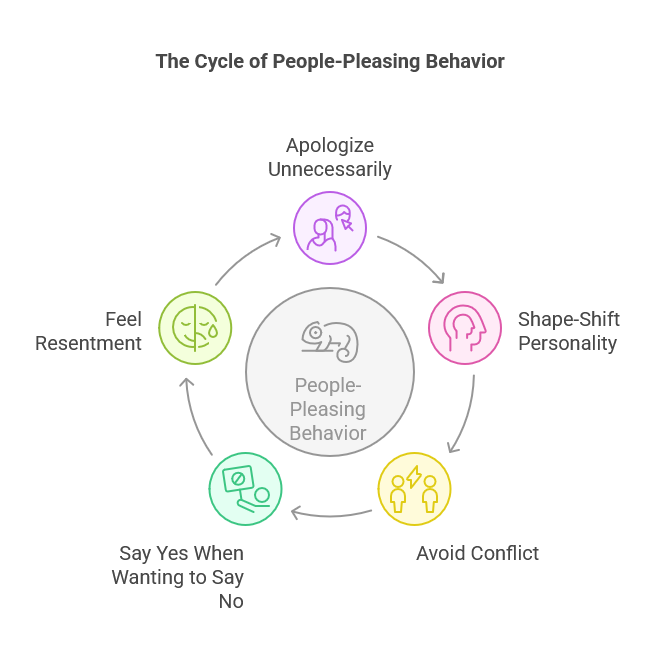Tired of Saying Yes All the Time? Here’s How to Stop People Pleasing
You say “yes” when you mean “ugh, no.”
You apologize for things that aren’t your fault.
You bend, twist, and stretch yourself to make everyone else happy—while quietly falling apart inside.
Sound familiar?
If your gut reaction to any kind of conflict is to smooth it over, say something nice, and pretend it’s fine (when it’s absolutely not), you might be caught in a cycle of people-pleasing behavior. And let’s be honest: it’s exhausting. Mentally, emotionally, even physically draining.
But here’s the thing—this isn’t some personality flaw. You’re not weak, broken, or doing life wrong. You’re just tired. Tired of being “the good one.” The peacemaker. The dependable one who keeps the wheels turning while your own needs quietly collect dust.
You’re not alone. So many women—especially working moms, caregivers, and high achievers—fall into this trap. But it’s not a life sentence.
You can unlearn this. You can speak up. You can say no. You can stop people pleasing without blowing up your relationships or losing yourself. And we’re here to help you do it.
What Causes People Pleasing Behavior? (It’s Not Just You)
Let’s bust a myth right away: people-pleasing isn’t just about being “too nice.” It’s not a personality quirk or something you chose. It’s a deeply ingrained coping mechanism—one that often starts long before we even realize it.
For many of us, people pleasing behavior begins in childhood. Maybe you grew up in a home where approval was earned, not given. Maybe saying “no” came with consequences—anger, silence, or guilt trips. You learned early that keeping others happy kept you safe, loved, or praised. Over time, being accommodating became your default.
And if you were “the responsible one” growing up—the sibling who kept the peace, the kid who got good grades, the one who made life easier for everyone else—you probably got a lot of validation for self-sacrifice. It felt good to be needed. It still does. But now, the cost is showing.
Then life layered on more pressure. You started juggling work, relationships, maybe kids. You became the one who could “handle it.” And when you’re a working mom or constantly caregiving for others, it’s easy to push your own needs to the bottom of the list. You start saying yes out of habit. You go along with things because it’s easier than dealing with guilt. You smile through resentment because no one taught you it’s okay to disappoint people sometimes.
Here’s the truth: people pleasing behavior isn’t your fault. It’s an old survival skill that outlived its usefulness.
But the good news? You can relearn new ways of being—ways that honour your voice, your needs, and your boundaries. That’s what real growth looks like. And it starts with recognizing the signs.
How to Recognize People Pleasing Behavior in Everyday Life
People-pleasing doesn’t always look dramatic. Most of the time, it’s sneaky—quiet compromises you make that slowly drain your time, energy, and emotional space. It shows up in the small moments: a hesitant “sure” when you meant “no,” an apology that tumbles out of your mouth before you’ve even thought it through.
If you’re not sure whether you’re caught in the cycle, here are a few telltale signs of people pleasing behavior that show up in everyday life:
1. You Say “Sorry” for Things That Aren’t Your Fault
You bump into someone and immediately apologize—even when it was them. You say “sorry” for taking up space, for asking a question, for being upset. You use it like a reflex, even when no apology is needed. That constant apologizing? It’s often a sign that you’ve been conditioned to make yourself smaller to avoid conflict or judgment.
2. You Shape-Shift Depending on Who You’re With
You’re a chameleon. Around one person, you’re bubbly and agreeable. Around another, you’re quiet and reserved. You edit yourself constantly—your tone, your opinions, your reactions—to make sure no one feels uncomfortable. The cost? You start forgetting who you really are when no one’s watching.

3. You Avoid Conflict Like It’s a Horror Movie
Disagreement? Tension? Someone raising their voice? Nope, you’re out. You’ll do anything to smooth things over—even if it means abandoning your own needs. Avoiding conflict can feel like keeping the peace, but often, it just leads to internal war with yourself.
4. You Say Yes When You Want to Say No
You agree to help. You volunteer. You stay late, show up, pitch in—again and again. Even when you’re bone-tired, you keep saying yes because saying no feels rude or selfish. And every time you override your needs, you build up quiet resentment.
5. You Feel Resentment… But Keep It to Yourself
Speaking of resentment—you feel it. Deep down, you know when someone’s crossing a line. But you don’t say anything. You bottle it up, paste on a smile, and keep being the “nice” one. Meanwhile, the frustration grows and eats away at your peace.
If you’re nodding your head right now, yep, you’re in the people-pleasing zone. But guess what? You can get out.
Recognizing these behaviors is the first step to changing them. Because when you can name it, you can shift it. And the goal isn’t to become someone who never compromises or who picks fights for fun—it’s to become someone who values their own voice as much as everyone else’s.
The Emotional Cost of People Pleasing (And Why It’s Not Worth It)
People pleasing might seem harmless on the surface. After all, who doesn’t want to be helpful, kind, or easy to get along with? But underneath that constant “yes” is often a slow erosion of your emotional energy, identity, and relationships.
If you’ve been living in people-pleasing mode for a while, you probably know this all too well: you start to feel… invisible. Not in a dramatic, everyone-forgot-my-birthday kind of way. More like a quiet fading of your wants, needs, and even your voice.
Let’s talk about what that really costs you.
You Lose Sight of Who You Are
When you’re constantly adjusting to meet others’ needs, you stop checking in with your own. What do you actually like? What makes you feel alive? What do you want to say, do, or be? Over time, people pleasing behavior can strip away your sense of self, leaving you feeling disconnected from your own values and desires.
If you’ve ever struggled to answer the simple question, “What do I want?”—you’re not alone. That’s what happens when your brain is constantly scanning for what other people want instead.
Burnout Becomes Your Baseline
When you say yes to everyone else, you say no to yourself. And it adds up.
Your calendar fills up. Your energy drains. Your emotional bandwidth gets stretched paper-thin. Eventually, you hit a point where you’re so used to being on autopilot, you don’t even realize how deeply exhausted you are—physically, emotionally, and mentally.
This is especially true for working moms and caregivers, who often take on an invisible second shift of emotional labor. You’re managing logistics, smoothing over family stress, handling work chaos—and doing it all with a smile. Until you’re too tired to smile anymore.
Your Relationships Suffer
Here’s the tricky part: people pleasing is often driven by the desire to keep relationships smooth. But ironically, it can create distance instead.
When you’re not honest about what you want or how you feel, resentment builds. You might start pulling away, or snapping unexpectedly, or feeling trapped in dynamics you don’t like—but never speak up to change. That emotional disconnection? It chips away at real intimacy.
Authentic relationships are built on honesty, not performance. And when you start choosing yourself, your relationships will either deepen—or reveal the places where they were one-sided all along.
How to Stop People Pleasing and Start Using Your Voice

You don’t need to become loud, combative, or confrontational to reclaim your voice. In fact, some of the most powerful shifts start small—quiet moments where you check in with yourself before checking in with everyone else.
Here are four simple, actionable steps you can try right now to start setting boundaries and honoring your needs:
1. Pause Before the Automatic Yes
When someone asks something of you, practice a simple pause. It doesn’t need to be long—just five seconds to check in with yourself.
Ask:
- Do I genuinely want to do this?
- Do I have the capacity for this right now?
- Am I saying yes to avoid guilt or awkwardness?
If the answer is no, give yourself permission to say that. You don’t need an elaborate excuse. A simple “Let me get back to you” buys you space.
2. Practice Saying No—Without Apology
Saying no can feel terrifying at first, especially if you’re used to being agreeable. But no is a complete sentence. You don’t owe anyone a full breakdown of your schedule, emotional state, or guilt level.
Try:
- “I’m not able to take that on right now.”
- “Thanks for thinking of me, but I’ll have to pass.”
- “I need to prioritize something else this week.”
And here’s a reminder: You’re not being rude. You’re being honest.
3. Use “I” Statements to Speak Your Truth
When you do need to express a boundary or feeling, lead with “I” statements. This reduces defensiveness and helps center your experience without sounding accusatory.
For example:
- “I feel overwhelmed when I’m expected to be available 24/7.”
- “I need some alone time tonight to recharge.”
- “I feel uncomfortable when plans are changed last-minute.”
“I” statements are your secret weapon. Use them generously.
4. Set Micro-Boundaries
Don’t try to overhaul your life in one dramatic boundary-setting day. Start small.
Say no to one favor. Speak up in one conversation. Ask for help with one task. Even texting, “Can I think about it?” instead of saying yes immediately is a win.
Micro-boundaries create macro change over time.
Reclaiming your voice doesn’t mean you stop caring about others. It just means you start caring about yourself, too. And the more you practice, the more natural it becomes.
What Happens When You Stop People Pleasing?

Stopping people pleasing doesn’t come with instant rainbows and applause. In fact, the first thing you might feel is guilt. Saying no? Terrifying. Disappointing someone? Feels like the end of the world. But here’s what most people don’t tell you: on the other side of that discomfort is real, undeniable growth.
You Start to Feel Like Yourself Again
When you stop shaping yourself to fit what everyone else wants, something wild happens—you start remembering who you are. Your voice gets stronger. Your needs feel valid. You stop second-guessing every decision just to avoid friction.
Instead of asking, “What will they think?” you start asking, “What do I want?”
And for the first time in a long time, the answer matters.
Your Relationships Get Realer—and Healthier
Not everyone will love the “new you.” That’s okay.
Some people have benefited from your people-pleasing behavior—your constant yeses, your flexibility, your silence. When that changes, it can cause friction. But that friction often reveals what the relationship is built on: authentic connection or unspoken expectations.
When you start setting boundaries, two things happen:
- The people who truly respect you adjust.
- The ones who only loved the version of you that said yes? They may pull away—and that’s a gift in disguise.
You deserve relationships where you don’t have to shrink to fit in.
You Create Space for Peace
Saying no doesn’t just protect your time—it protects your energy. It creates room for rest, joy, clarity, and creativity. You start living on your own terms, not just reacting to everyone else’s needs.
And suddenly, peace isn’t a vacation luxury. It becomes part of your daily rhythm.
Stopping people pleasing isn’t about becoming cold or disconnected. It’s about showing up as your full self—with clarity, boundaries, and self-respect.
And yes, it’s a journey. Which brings us to…
What If You Slip Back Into Old Habits? (Spoiler: You Will)
Let’s set this straight: unlearning people pleasing behavior is not a one-time decision. It’s a pattern you’ve practiced for years—maybe even decades. So if you find yourself defaulting to old habits, it doesn’t mean you’ve failed. It just means you’re human.
Growth Isn’t Linear—it Loops
You might rock a boundary one day, then totally crumble the next. You might say no confidently… and then feel terrible about it for hours. That’s not failure. That’s progress in motion.
Think of it like building a muscle. The first few workouts feel awkward and shaky. But the more you practice, the stronger you get.
Watch for Your Triggers
Certain situations are more likely to drag you back into people-pleasing mode. A boss’s last-minute request. A parent’s disapproval. A friend’s subtle guilt trip. These moments are powerful—but so are you.
When you catch yourself reverting, pause and ask:
- “Am I doing this because I want to—or because I feel obligated?”
- “What boundary did I ignore just now?”
- “What do I need in this moment?”
Awareness is your first line of defense. You don’t have to be perfect—just present.
Celebrate the Small Wins
Did you ask for more time before saying yes? Did you express a need, even if your voice shook? Did you notice you were slipping and choose to stop mid-sentence?
That’s growth. That’s healing.
You don’t need to flip your life upside down to change your relationship with people pleasing. You just need to keep showing up for yourself—one conversation, one choice, one boundary at a time.
And if you need backup? We’ve got you.
Our certified life coaches can help you navigate the messy middle—the slips, the second-guessing, the “Was that too much?” moments. Tap here to get support from someone who understands.
Are You Done People Pleasing? We’ve Got You.
If you’re reading this thinking, “That’s me. I’m done overthinking, over-giving, and over-apologizing,” then welcome. You’re exactly where you need to be.
You don’t have to be loud to be powerful. You don’t have to do it perfectly to do it differently. And you definitely don’t have to do it alone.
Whether you’re ready to say “no” for the first time or still stuck wondering if your needs are too much (spoiler: they’re not), we’re here to help you find your voice—and keep using it.
FAQs about How to Stop People Pleasing
What can I actually say when I want to stop people pleasing—but still be kind?
Speaking up doesn’t mean you have to be rude or cold. It just means being honest, clear, and kind to yourself, too.
Here are a few mini scripts you can keep in your back pocket for everyday moments:
- “Thanks for asking, but that won’t work for me right now.”
- “I need some time to think about that.”
- “I’m not comfortable with that—can we talk about another option?”
- “I’ve got a lot on my plate and can’t take that on.”
- “I’d love to help, but I need to say no this time.”
You don’t have to overexplain. A respectful no is still a no. The more you practice, the easier it gets—and if you ever need help figuring out what to say in a tricky situation, our certified life coaches are a tap away.
Why is it so hard to stop people pleasing, even when I know it’s hurting me?
- Because for many of us, people pleasing has been a form of survival. It often comes from a deeply ingrained belief that love, acceptance, or safety depends on keeping others happy. It feels risky to set a boundary. It feels uncomfortable to say “no.” And sometimes, it feels easier to betray yourself than to disappoint someone else. But here’s the truth: every time you honor your needs, you build trust with yourself. You’re not selfish. You’re just learning how to value your voice as much as everyone else’s. And you don’t have to do it perfectly. You just have to start.
Can life coaching really help me stop people pleasing?
Yes—absolutely. A certified life coach won’t just tell you to set boundaries and call it a day. They’ll help you understand where your people pleasing behavior comes from, what triggers it, and how to shift it—step by step, at your own pace.
Here’s what you can expect with Be My Life Coach:
- Gentle, judgment-free conversations with someone who gets it
- Real-time support when you’re navigating a tough moment
- Tools and language to practice healthier boundaries
- Guidance for rewriting old people-pleasing patterns without guilt